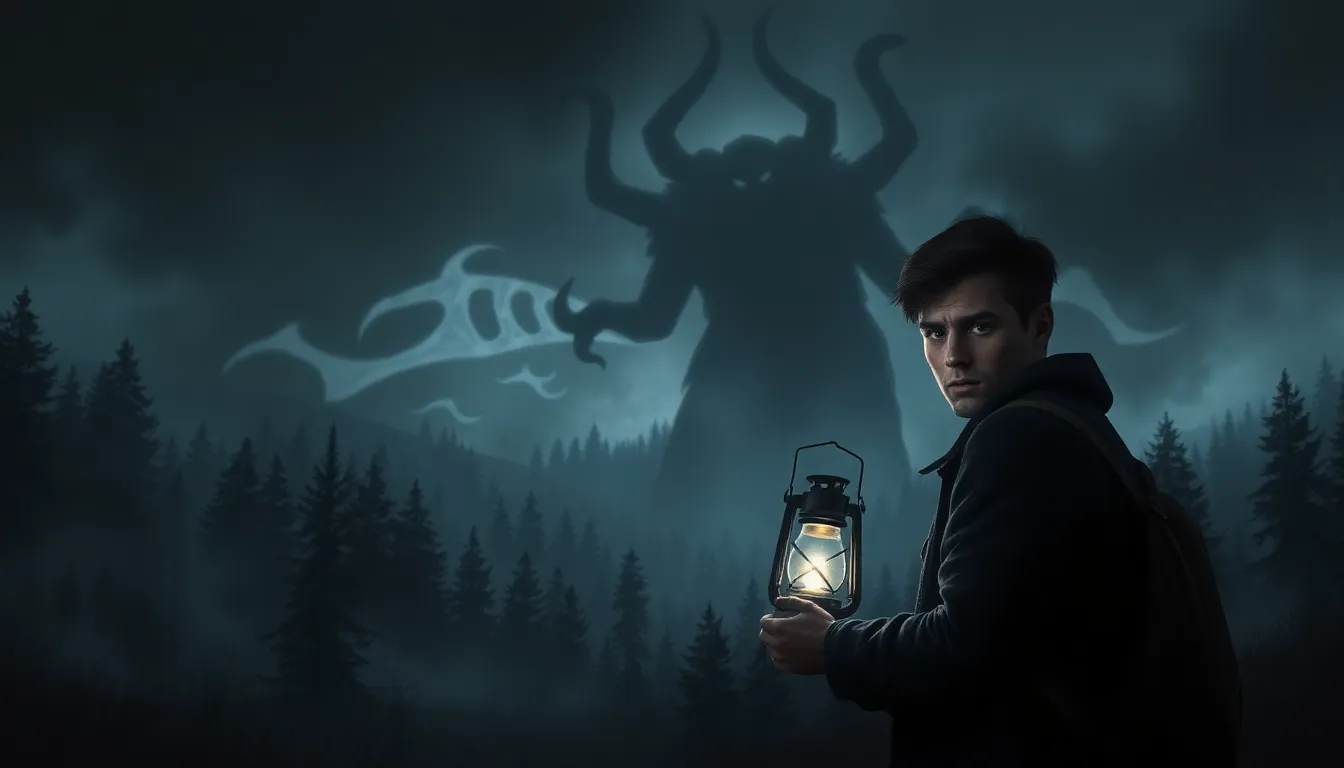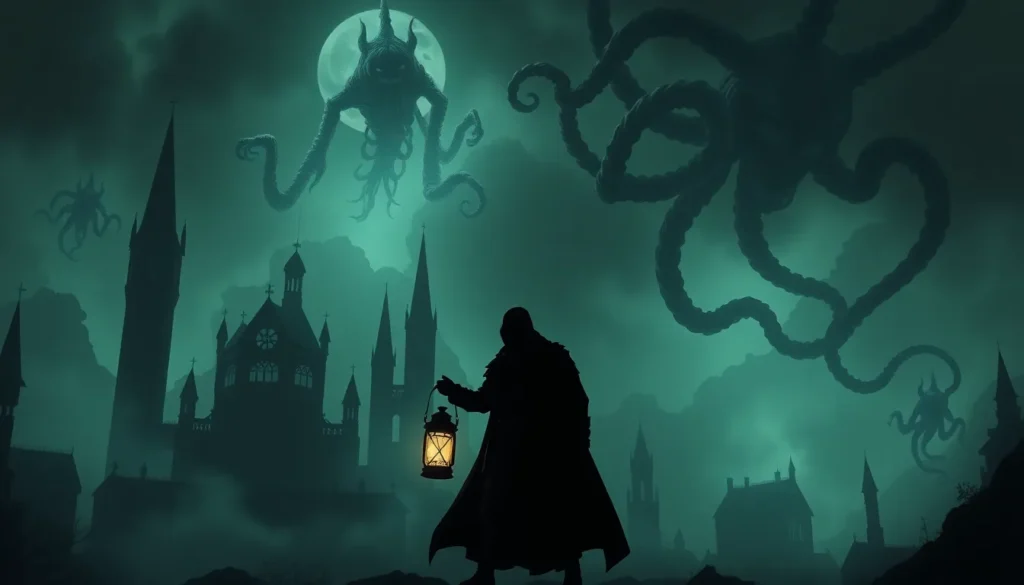Table of Contents
ToggleIn a universe filled with unfathomable mysteries and cosmic dread, cosmic horror games invite players to confront their deepest fears. These games take players on a wild ride through the unknown, where sanity teeters on the edge and the bizarre becomes the norm. Imagine battling eldritch horrors while trying to keep your wits intact—talk about multitasking!
With a blend of psychological tension and otherworldly terror, cosmic horror games serve up a delightful cocktail of fear and intrigue. Players aren’t just fighting monsters; they’re grappling with the very fabric of reality itself. So, if you’re ready to embrace the madness and explore realms beyond comprehension, buckle up. It’s time to dive into the chilling world of cosmic horror gaming, where the only thing scarier than the monsters is the realization that you might never truly escape.
Overview of Cosmic Horror Games
Cosmic horror games immerse players in unsettling, mysterious universes filled with existential fears. These games challenge players to confront eldritch horrors that strain the boundaries of sanity. Fear manifests not only through grotesque monsters but also via an overwhelming sense of impending doom.
Players often face insurmountable odds, as the gameplay revolves around maintaining sanity while navigating their terrifying environments. Psychological tension remains a crucial aspect, where every decision impacts the character’s mental state. This tension heightens the experience, forcing players to question their grasp on reality.
Mythos developed by H.P. Lovecraft serves as a foundational influence on many cosmic horror games. Players encounter ancient deities and cosmic entities, which underscore the insignificance of humanity in the vast universe. Explorable settings often include derelict towns, surreal landscapes, and dark voids where nothing is as it seems.
Unique gameplay mechanics further distinguish cosmic horror from other genres. Limited resources compel players to think strategically when facing mysterious adversaries. Unpredictable encounters keep them on edge, ensuring that the thrill of the unknown remains front and center.
Despite the chilling themes, communities around these games flourish, fostering discussions and fan theories. Players share experiences, dissecting plot elements and uncovering hidden lore. These communal interactions enhance the overall enjoyment and deepen appreciation for the narrative intricacies that make cosmic horror games so compelling.
Key Elements of Cosmic Horror

Cosmic horror games incorporate several essential elements that collectively create an atmosphere of dread and unease. These features elevate the gaming experience, immersing players in a world where the boundaries of sanity and reality blur.
Theme of Insanity
Insanity permeates cosmic horror games, establishing a constant state of psychological tension. Players often navigate environments that distort their perception, leading to a gradual descent into madness. This theme manifests through gameplay mechanics where characters may lose sanity when encountering unsettling sights or events. As players confront existential dread, their grip on reality weakens. Understanding that irrationality is a central element reinforces the chilling experience. Characters may also suffer from hallucinations and fragmented memories, heightening the immersive quality. Engaging with this theme allows players to explore profound fears while battling inner demons.
Cosmic Entities
Cosmic entities serve as the primary antagonists in many cosmic horror games, challenging players with their sheer incomprehensibility. These eldritch beings embody the vastness of the universe, often representing forces that defy human understanding. Players typically encounter ancient deities or malevolent entities whose motives remain elusive. This sense of insignificance against greater cosmic forces amplifies the horror. The designs of these entities frequently evoke both fascination and repulsion, creating a lasting impact. Players experience dread when facing their unpredictability and immense power. Engaging with these cosmic entities offers a unique gameplay dynamic focused on survival rather than vanquishing foes.
Popular Cosmic Horror Games
Cosmic horror games draw players into unique, unsettling worlds filled with existential dread and extraordinary challenges. Two standout titles exemplify this genre’s impact.
Game 1: Bloodborne
Bloodborne immerses players in the gothic city of Yharnam. Here, a plague taints the population, leading to monstrous transformations and horrifying revelations. As players traverse the haunting environments, they confront eldritch beings and must navigate their own sanity. Combat emphasizes agility and strategy, requiring quick reflexes against relentless foes. The game’s atmosphere evokes dread through dark architecture and unsettling imagery, reinforcing the incomprehensible nature of cosmic horror.
Game 2: Call of Cthulhu: Dark Corners of the Earth
Call of Cthulhu: Dark Corners of the Earth invites players into a chilling narrative based on H.P. Lovecraft’s works. Featuring the coastal town of Innsmouth, the game explores themes of insanity and cultist rituals. Players solve mysteries while battling madness, facing growing despair as they uncover horrific truths. Stealth and puzzle-solving mechanics enhance the tension, highlighting the fragile grip on reality. Lovecraftian lore fills the environment, enriching the experience as players confront the terror of the unknown and their own vulnerability.
Gameplay Mechanics in Cosmic Horror
Gameplay mechanics in cosmic horror games emphasize psychological tension and resource management. Players frequently manage limited resources, such as ammunition and health, which enhances the sense of dread. Decisions become critical as players navigate environments filled with eerie sights and sounds that threaten their sanity.
Sanity serves as a key mechanic, dictating player experiences while encountering cosmic horrors. Characters face unique challenges as their mental states deteriorate, manifesting through hallucinations or altered perceptions of reality. Hallucinations create misinterpretations of surroundings, leading to strategic missteps and augmenting fear.
Unpredictable encounters punctuate the gameplay, where players confront grotesque entities that defy human comprehension. Each entity’s design heightens apprehension, blending fascination with revulsion. Combat strategies adjust according to the unpredictability of these foes, ensuring players approach each encounter with caution.
Environmental storytelling also contributes to gameplay dynamics. Environments filled with unsettling imagery amplify immersion, often reflecting the fractured minds of protagonists. Clues hidden within surroundings lead players deeper into the narrative while exacerbating themes of isolation and existential dread.
Additional mechanics include time-limited events, which challenge players to complete objectives under pressure. Such elements enhance the urgency to make swift decisions while navigating perilous landscapes.
Titles like Bloodborne and Call of Cthulhu: Dark Corners of the Earth exemplify these gameplay mechanics. Bloodborne promotes agility and strategic combat against quickly evolving threats, while Call of Cthulhu: Dark Corners of the Earth immerses players in a narrative steeped in insanity-driven encounters. Through these refined mechanics, cosmic horror games excel in delivering chilling experiences that resonate long after the credits roll.
Cosmic horror games offer a unique blend of psychological tension and existential dread that captivates players. By confronting the unknown and navigating through surreal environments, they provide an experience that challenges both strategy and sanity. The genre thrives on its ability to evoke fascination and repulsion through its grotesque entities and haunting narratives.
As players engage with these chilling worlds, they become part of a vibrant community that shares insights and theories, deepening their understanding of the intricate storytelling. With titles like Bloodborne and Call of Cthulhu: Dark Corners of the Earth, the cosmic horror genre continues to expand, inviting players to explore the depths of madness and the fragility of reality. Embracing this genre means stepping into a realm where the unimaginable lurks just beyond comprehension.




